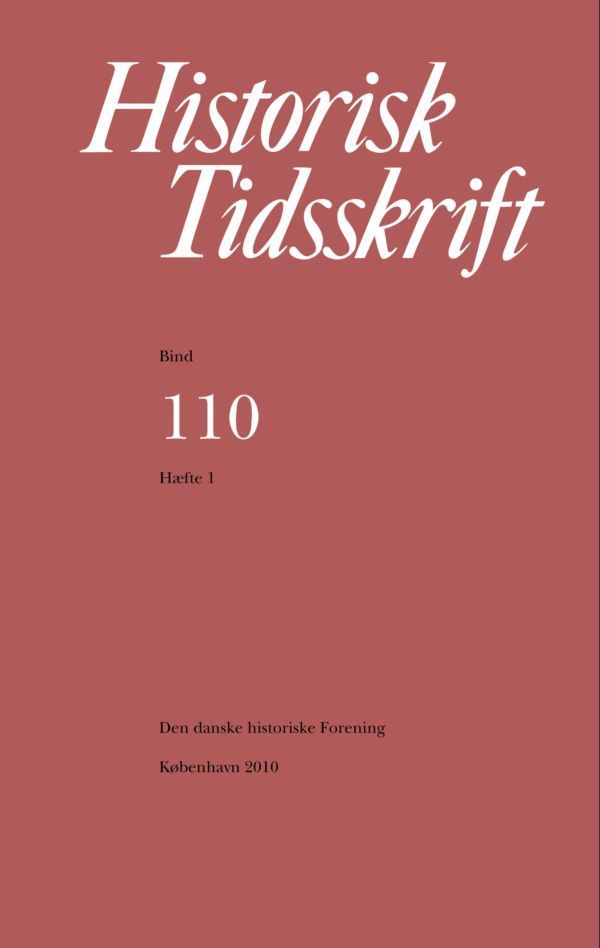Den grimme lovs genealogi. Et kapitel af homoseksualitetens historie i Danmark
Resumé
The Genealogy of the »Ugly Law« A Chapter in the History of Homosexuality in DenmarkIn 1961, the Danish Parliament revised the penal code, making it a criminal offence to receive sexual favours – in return for payment – from persons of the same sex under 21. At the time, the ordinary age of consent was 15 for heterosexual relationships and 18 for homosexuals. This article analyses the genealogy of the bill, dubbed »the Ugly Law« by the press. Initially, the reform process was occassioned by concerns in the 1930s over female prostitutes. The police considered it pointless to treat them like criminals and inquired whether a more humane approach was possible. Before wartime conditions ended these early efforts, psychiatrists had concluded that a modern and scientific approach should include eugenic registration, mental hygiene, and better social conditions for the prostitutes. After the war, two new discourses on sexuality and prostitution appeared in Denmark: a budding liberationist discourse on homosexuality, and a public moral panic over the spread of male homosexual prostitution. The parliamentary committee charged with updating the laws on prostitution suddenly had to include this issue in their considerations. Thus, the 1950s saw an unprecedented public discussion on the subject, centred on the perceived social problem of boy prostitution, which was indeed widespread in Copenhagen. The old medico-psychiatric discourse had emphasized tolerance, treatment, and hospitalization, but was losing ground as a new moral, panic-driven discourse expressed public condemnation and demanded stricter laws and protection of the youth. A central figure in these debates was police superintendent Jens Jersild, leader of the vice squad in Copenhagen and member of the parliamentary committee on prostitution. Inspired by Kinsey, he discarded medical and psychiatric approaches to homosexuality; instead, he took a criminological and sociological view of the »homosexual problem«. Jersild considered male prostitution to be the result of seduction by homosexuals and believed that all young men were potential victims. Although looked upon by homosexuals as their enemy no. 1, Jersild repeatedly stated that they had every right to live in peace and act out their desire as long as they found partners of equal age. Other, competing views were incompatible with these notions. Psychiatrists and the emerging self-conscious homosexual community protested publicly against Jersild’s »seduction theory«, claiming that individuals were born homosexual. When the »Ugly Law« was discussed in Parliament in 1961, traces of all these different discourses had left their mark and confusion was prevalent. Most agreed that homosexuality was not a problem per se, as long as young folks enjoyed protection. The result was the aforementioned 21 years-limit, well above not only the age of consent, but also the attainment of majority. Indeed, a paradoxical result of a discussion that started out with the purpose of replacing police control with social improvements. A program of registration, control, and surveillance was the common platform of most MPs, but half-heartedly so. Disagreement was rife and Parliament soon abolished this »ugly« section of the penal code in 1965. A rather positive result of the discussions of the 1940s and -50s was that they ended up creating a space for homosexuals as respectable members of society, also in terms of sexual morality, as long as intercourse was between individuals of proper age.Downloads
Publiceret
Citation/Eksport
Nummer
Sektion
Licens
Ophavsret til bidrag i Historisk Tidsskrift tilhører forfatterne og Den danske historiske Forening som udgiver af Historisk Tidsskrift. For illustrationer gælder den ophavsret, som står anført i billedteksten. Ophavsretslovens almindelige bestemmelser gælder, hvilket vil sige, at ophavsretten gælder i 70 år efter forfatterens død. Bidrag i Historisk Tidsskrift må derfor, med forbehold for en ”moving wall” på tre år, frit downloades, læses, gemmes, anvendes og citeres (med kildeangivelse) i privat og videnskabelig sammenhæng, men de må ikke helt eller delvis genudgives af tredjepart, heller ikke i redigeret form, uden tilladelse fra forfatterne og Den danske historiske Forening. Henvendelse skal i så fald rettes til Historisk Tidsskrifts redaktion på histtid@hum.ku.dk.





